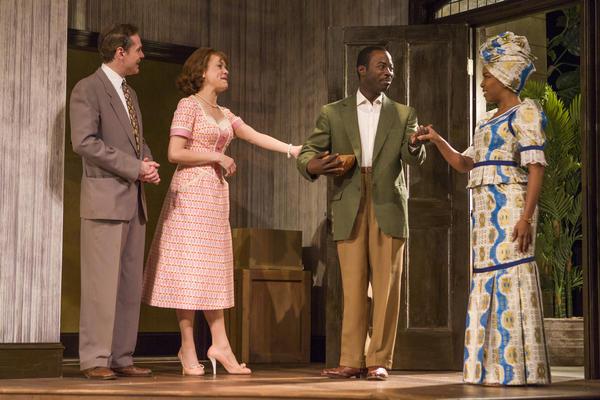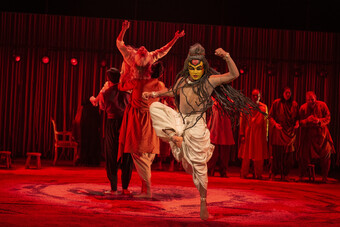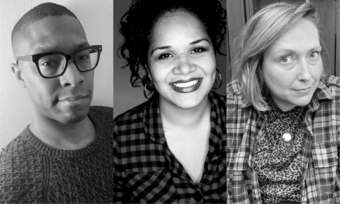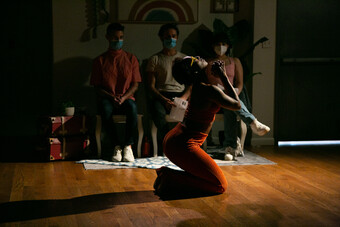Creating from the Vanguard
The Sanctity of Ownership
This is a new regular column featuring musings, observations, and strategies from the frontline of cultural theatre-making in the 21st century.
A few weeks ago, Centerstage in Baltimore invited Lydia Diamond, Kirsten Greenidge, and I to the opening of artistic director Kwame Kwei-Armah’s Beneatha’s Place. We were also asked to sit on a pre-show panel to discuss the ownership of narrative, among other things. I was thrilled and honored to sit on the panel. I was also geeked to experience a live performance of Kwame’s dramatic imagining of Hansberry’s Beneatha—an imagining that sends the signature character to a tense 1959 Nigeria. Beneatha’s Place was bold and daring, particularly in its exploration of political and cultural ownership in Nigeria. Ownership was the theme of the night.

During the panel, Kwame asked about racial fatigue in context to playwriting—the idea that artists of color would grow weary of being pigeonholed as race conduits. You know, the idea that artists of color are not capable (or allowed) to simply tell a story without attaching a racial appendage. Kwame asked the panelists to rate our racial fatigue on a scale of 1 to 10. Without hesitation I answered with an 8. However, after some thought and post-panel vino, I realized my fatigue isn’t racial at all. It’s much more about ownership fatigue—a fatigue informed by holding up the conversation around ownership all by myself, or only with artists of color.
Ownership informed by privilege informed by institutional access to resources that are shared and bartered among the privileged.
However, after some thought and post-panel vino, I realized my fatigue isn’t racial at all. It’s much more about ownership fatigue—a fatigue informed by holding up the conversation around ownership all by myself, or only with artists of color.
Since earning my M.F.A. from Iowa in the late nineties, I have seen and endured plenty of institutional curiosities—playwrights of color overlooked for productions without explanation, playwrights of color denied production due to an unsympathetic or narrow-minded subscriber base, playwrights of color in competition with each other (as well as women and LGBT artists) for a production, playwrights of color dragged through development hell with no production in sight (read London and Pesner’s Outrageous Fortune), and plays of color written by white playwrights selected for production despite similarly-themed plays written by artists of color. Needless to say, a concerned member of the theatre community would want to make sense of this curious trend before jumping to racist conclusions.
During the Q & A after the panel, a woman on crutches came to the mic and asked about ownership of narrative. She was concerned about the amount of black content being written and directed by white theatre artists. She wanted to know our thoughts on the matter and what we were doing about it. Although we were all excited to finally dig into the big theme of the night, time was not in our favor. Kwame was counting down the seconds before his opening and the rest of us were looking at the clock as well. So the woman’s question was answered with brevity, and we concluded with a thank you and good night.
I wanted to say much more. I wanted to say this: yes, from the vantage point of most theatre artists of color, white theatre artists have a better chance of having their plays of color produced. Many white artists are deemed the owners of cultural understanding. Many are nurtured and developed (and often produced) by companies who physically own their theatre spaces, own the flexibility to engage with various demographics, and own the right to ignore the imbalance in produced plays by playwrights of color. I wanted to say there’s not enough conversation around the history of ownership in theatre (and America for that matter) and it appears to be the big elephant in the room.
A month ago, I attended an exciting salon-style think tank in Harlem called Blind Spot spearheaded by Obie Award-winning actor and LAByrinth member Russell Jones. Blind Spot is a courageous attempt to bring together artists from all walks of life to have discourse around privilege and ownership, its regressive impact on our collective community, and how to identify solutions for forward motion. During Blind Spot I met a self-proclaimed (and rather cool) progressive guy who was also white. He talked passionately about his theatre company and their attempt at addressing race. I told him I was aware of his company and admired them from afar. I shared with him that I was the co-founder of The New Black Fest, a theatre collective committed to celebrating and unearthing the diversity within the African Diaspora. He never heard of it.
I asked him why is it that most white theatre artists don’t attend theatre by and about people of color, but the assumption is that artists of color should know and support their theatre-making. His answer was deliciously honest. He said most white theatre artists don’t feel that theatre by people of color threatens their privilege because white theatre artists know (whether they articulate it or not) that they own everything. In a nutshell, if their ownership (or privilege) is not threatened, ignorance is bliss—there is no consequence for not knowing or engaging. After standing there in a moment of silence, he then said: “I need to work harder at challenging myself and my peers to look at our privilege so we can get out of our way and make room for everyone else.”
Like so many, I have spent a great deal of my life taking ownership of myself—personally, culturally, and artistically. This is why I deem the art of narrative a sacred thing. It’s my testament. It belongs to me. So when someone has the ability to appropriate my narrative—to own it—it blocks true cultural and artistic progress. Isn’t art about sharing what you know with others— not denying or ignoring what someone else knows?
It mattered to me that idea of ownership became crucial in the discussion at Centerstage. Notions of ownership permeate our minds, our beliefs, and our nations. From Beneatha’s Place to Clybourne Park to Kirsten Greenidge’s Luck of the Irish to Thomas Gibbon’s Permanent Collection to early America’s paper trail of bills of sales, deeds, and last wills and testaments, the power of ownership has left many people and places feeling voiceless, homeless. At the end of the day, it doesn’t really matter that so-and-so white playwright has written a play about enslaved black people, or whatever. However, it does matter that more playwrights begin to understand that privilege, although institutional, and habitual, is often the culprit behind the imbalances in who truly owns and has the right to own what. Let’s all begin to look at this so we can get out of the way and make room for everybody.












Comments
The article is just the start of the conversation—we want to know what you think about this subject, too! HowlRound is a space for knowledge-sharing, and we welcome spirited, thoughtful, and on-topic dialogue. Find our full comments policy here
great piece and thank you, keith josef adkins, for this piece and for all you do! also would like to talk about moving characters from other plays forward in time with other playwrights picking up the story first told by someone else. wonder how I would feel about someone writing a play about the little baby that gets born at the end of "Flyin' West." i'm so curious about
"Beneatha's Place." I think my fatigue comes when we find ourselves talking about the social issues that impact us at every level, but never get to just talk as artists about the art we're producing. so my question is: how was the play??
What is art if not social issues--how people act towards one another socially or is it, sociably? Actually, most of the issues brought to the fore by Keith, are issues of discrimination---asocial issue for artist ranking in the top ten. A production is a job---artist of colour do not like many other people of colour, do not get the job.
As for you longing to move a work forward. I have such a project where a family in a 1945 story's, progeny continues the journey in contemporary times.. Many of my works are reactions to the works of others. I consider drama a continuing dialogue among playwrights--- What comes after is a response to what came before. Like life itself.
The
discussion surrounding the topic of “ownership” is much like Erin Merritt asserts
concepts of ownership are in many cases mythologized. Yet on the other hand, it’s a dialectical consideration
concerning the modes of production. It
is also misleading to talk of “white” ownership; when in fact, the leading
charge is distinctly an issue of Western European Cultural
Domination, even here in America. Not
all whites are in this category, though, as matters of racial connection, they
can benefit, But only insofar as they hew to party lines.
The issue is
lack of control of those elements that comprise a fuller spectrum (read Black,
and other people of colour) of the theatrical process. By this I mean to say, most theater in
America is non-profit. It is dependent on the dole system. The dominating systems, frankly, are disinclined
to support structures that do not lend themselves to continued domination of
the cultural imperialistic models of expression. It is foolhardy to think otherwise.
The entire
mechanism of American Theater is a myth of the political-economy of the
cultural imperialism matrix; from the education and the billions of dollars
invested by students, usurped by faculties, their institutions with billions of
dollars devoted to cultural imperatives; and finally the game changers, the
audiences to whom the end product is produced.
In
specifics, Black Theater is not taking any risk with new works or ideas about
how to produce those works. The same exhausted,
time honored conventions are firmly in place. Knowing what I know now. I would
have come to the theater as a producer in my early years, rather than a writer.
There exist little infrastructure to support non-European theatre on the local
and national levels.
Concepts of ownership
are a western Judeo/Christian motif centered in the Divine mandate of stewardship of the creations of God. Theater
like neo-colonization is a profitable undertaking in this wise. This mythological mandate has created more problems
than it solves. American Theater is currently facing a very serious condition
of denial.
The fact its
institutions wax fat on self- cannibalism decries the truth, that it is in
fact, eating and devouring itself. Those
of us on the outside looking in are blind to notice we are slated for the next
item on the menu.
If one does
not develop an independent model of control of the modes of production, then we
are doomed to the merry-go-round of high expectations, with lowered returns.
In my own
case, I am currently working on a script YOU---largely a story of dysfunctional
lesbian lovers in a constrained dystopia where anything goes, but not far
enough. Can I not do this because I am a man and I don’t own the right to
discuss those issues dramatically?
Anyone can
and should write anything they want to. However, the reality is just through
here, we can’t without controls of the modes of production. The contradictions of this social and artistic
abnormality is internal and until this fact is recognized. The imbalance will
continue.
Owa
May
28, 2013
Bronx,
NY
Would love to grab tea with you and discuss this more. I am in NYC as well!
646-786-9434
not sure how this works. already sent reply.
cool!!!
Erin, yeah, let dialogue
Thank you for writing this. I think the "cool white guy" is right, of course, but I find myself facing a different issue: I am white, and most of the plays that I really feel moved to see produced right now are plays by and about people of color. I am a former AD/producer, but right now I am only a freelance director, so I am in the awkward position of going to other companies as a beggar for work. As I enter each room and pitch the 2 or 3 plays, I am not sure which to pitch. If I were in my native Bay Area, I would probably open by giving them a freebie in a way—"here are some fantastic plays that you should absolutely produce without needing to hire me, and here are the three I see as most appropriate for myself." Or if this were a just world, where we all got equal access to representation—if there were more Ang Lees directing Sense and Sensibility too—I might feel okay saying, "Yes, this story is by and about Asians, but it is universal and for audiences of all ethnicities, and I trust the Asian cast to make sure I don't get anything horribly wrong." However, I am currently in a market where white people run everything—they do hire actors of color and of course they do their "ethnic play" every February—and I have neither the clout nor the knowledge of the artists of color to tell the ADs who they should hire, so I'm torn. I have no idea whether they are making any attempt to develop directors of color or simply not bothering to hire directors of color who might already be in town. Do I push these companies to do more before I even know them? I'm also subtly trying to push them to do plays that feature women as well (as more than the Mays in Fool for Love and Annas in Burn This who inexplicably stay with men who are obviously wrong for them and so we never get to see their true potential). I guess I'll do the same pitch of "plays for others to direct and plays for me to direct," but if anyone has any other advice, I'd love to hear it. Alternatively, if I were to pitch or be offered a play about, say, the African American experience, should I turn it down or take it and try to affect change from within? Again, in the Bay Area I'd ask, "Why aren't you offering this to Director A or Director B?" but here, perhaps it's better to take it and use it as an opportunity to get that spectacular piece of writing in front of a public, while quietly developing one of the actors in it as a director too? Has anyone else been on either side of this position? And finally, actors of color, what do you want from a white director when your stories are being directed by one of us? What are the best ways—besides the obvious researching and listening to you—for us to represent you when we are in that awkward position of guiding a story that is clearly on some obvious level not ours? My only frame of reference is feeling like there are certainly some men who could direct a play about women, but that it feels creepy when they do, anyway, because there are so many women capable of doing it too.
Great piece! I'm so glad you not racially fatigued!! You to much of a warrior to be----- the real work for our generation is beginning and "we who believe in freedom cannot rest"!!!!!!!!!!!! If others had allowed their fatigue about any issue reign supreme, you would not be writing on this blog and this blog would not exist.
I am interested in your thoughts on ownership. I agree that ownership should be culturally specific but I dream of a world where we work through all the elephants in the room And ownership is for the whole... If you think about it, what is ownership? How does one really own Anything? What does that truly mean? Ownership is an illusion and in this American Theatre some have climbed the ranks by making others believe that it was possible-- I look forward to the rest of your thoughts on what we do around these topics!! Until then, peace!!!!!
I have to agree with Erin W.... you are a valiant warrior man playwright. I am in awe of your intellect and your perspective.
Great column and the issue of representation/ownership is an important one. And I think you're absolutely on point about the imbalance of representation and privilege in the theatre community.
I also think, however, that we should be careful about how we define ownership. There is a fine line between ownership and putting people in a box. For example, I don't know that I agree with the idea that plays about a particular group of people should only be written/performed/directed by members of that same group of people. Yet at the same time, I also understand that it doesn't really make sense to choose a white-written play about black issues when there are similar plays written by black writers who may have more ownership/understanding of that topic.
That concept of ownership, however, while empowering at times, can also be limiting and shallow at other times. Some white theatre managers, recognizing this issue of ownership, attempt to address it bringing in the black director and black writer to do the "black play" of the season. On one hand, it's perhaps a well-intentioned gesture and may address the issue of ownership in some small way....but isn't that also putting black artists in a box? Does a black director only want to get called in to direct "Fences"? (Obviously, this also gets at issues of privilege about how/why plays are chosen, but I digress....)
The real issue is about dialogue and representation in how the plays are chosen and produced. It isn't just about having a person of the corresponding race direct or perform in a particular play.
And let's not also forget that issues of ownership go beyond just race. What about economic status? etc. How do you determine who "owns" a particular issue or topic? Does a wealthy black person have ownership of a play about life in poor black neighborhoods simply because of their skin color?
Finally, let's also not forget about the potential for new discoveries that comes when artists venture outside of their comfort zones and out of the pre-determined labels that society puts on them.
Personally, as a theatre artist, I prefer to explore issues, characters and experiences that are *different* from my own life. For the most part, I'm not interested in doing plays about myself...and I don't think there's anything wrong with that. As a gay male, for example, my interest in doing gay "issue plays" is somewhat limited. I spent most of my teen and adult years exploring that topic, so I don't really feel compelled to do that onstage unless there's a particularly exceptional play that speaks to me.
Yet at the same time, I recognize that, if I'm going to explore someone else's story, I have an ethical obligation to seek the fullest understanding possible, to approach it with humility and respect, and to not assume that I have a monopoly on understanding.